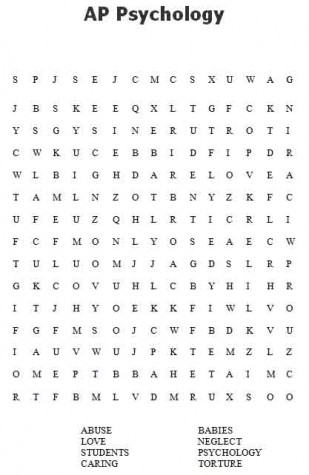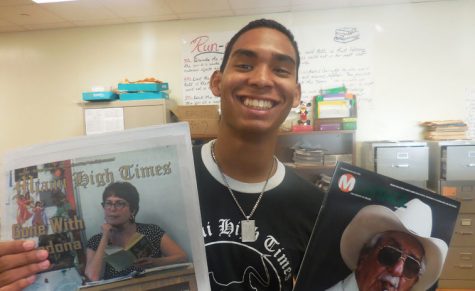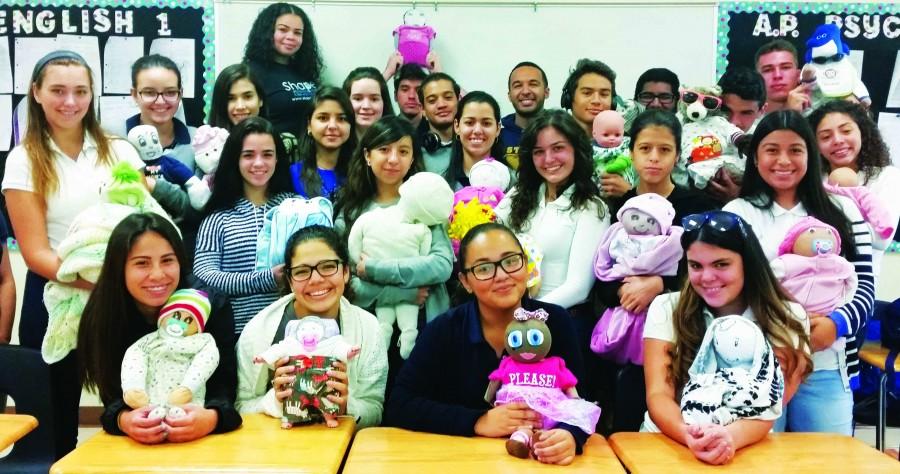Babies on Board
“What a beautiful baby you have!!!”
“I hate it so much.”
“Why? How long do you have to carry it for?”
“I have to carry this five pound ‘bundle of joy’ for two weeks.”
“How many grades is it worth?”
“Eight.”
“Lame.”
AP Psychology is a hard class by itself. Now imagine having to carry a 5-10 pound baby for two weeks because your grade is depending on it.
“We were studying the chapter on Human Growth and Development,” said AP Psychology teacher Ms. Fernandini, “and it was important for me to have my students understand that all child development theories came from intense observation. The best way for them to understand that principle, was from intense observation themselves. This generated a report on significant theories of child, adolescent, and adult development.”
Monitoring the parents
Keeping an eye on all of her students and their babies was no easy task for Ms. Fernandini. She needed a way to monitor that all of her students actually cared for their child. So she took photographs of the parents with their babies as a way to identify them either together or apart from each other.
During her planning period she would go investigate on her own, but she also had some assistance from her freshmen. “I offered my freshman English students extra credit for showing me photographic evidence of abuse and neglect,” said Ms. Fernandini. “ I informed my AP Psychology students of it, naturally, to keep them on their toes, but it was fun to give them their own paparazzi.”
Sophomore AP student Haley Shaifer said, “I was always scared because I didn’t want to mess up with the baby, and the freshmen scared me because they were stalking me, ready to capture me making a mistake.”
The Pros and the Cons of parenting
Some students genuinely cared about their children. “I actually got attached to it, I was careful with whom I gave it to, and it wasn’t just everybody. I would go home and wouldn’t let my sister touch him either. I was careful in the hallways too, with bumping into me or me into them. I loved my baby and I was happy carrying him around,” said junior AP student Grethel Acevedo.
Senior Jennifer Barrios said, “That the best part was that you learn how to be responsible when taking care of a baby.”
“The best part was when I told my mother-in-law I was having a baby,” senior Claudia Garcia.
Not all the parents were so happy.“The worst part was having to shield my baby from the outside world to make sure it was safe,” said sophomore Azhar Moihdeen.
“The worst part was that everyone thought I was a teen mom,” said senior Jessica Riopedre.
Some people saw it both ways. Junior Roxana Amador said, “It was annoying sometimes, but people offered to carry it for me. My hands felt like falling constantly.”
Sophomore Giovanni Castillo said that he both liked and disliked the attention he received for his baby.
Lessons learned
The child project changed many of the students’ outlooks on what it means to be a parent. Mariougel Leon, a junior, said, “It made me feel that I was able to take care and be responsible.”
On the other hand, many of the students feel that they now will not want children, at least for a while. Haley Shaifer said, “It made me never want a baby until I’m forty. The good part was practice for the future; the bad part was I always had to watch it and actually take care of it which was hard because I have a lot of after school activities.”
Junior Roxana Amador said, “I never want children thanks to this assignment”
Ms. Fernandini said, “Some kids really took to it – cared for their baby, dressed it, kept it dry, did their hair. Others however, had their babies crowd-surfing at the Homecoming lunch activities (abuse) or forgot to get them out of another teacher’s locker (neglect). Another student’s baby was leaking so she threw the baby away in the trash. A custodian gave it to Mr. Zabala who, of course, notified the whole school in search of its mother.”
Can you find these words from the story above?


Christian Nathan Lozano, 17, a senior in Journalism 4 at Miami Senior High school. He enjoys community service, food, magic, and trying new things. He...

